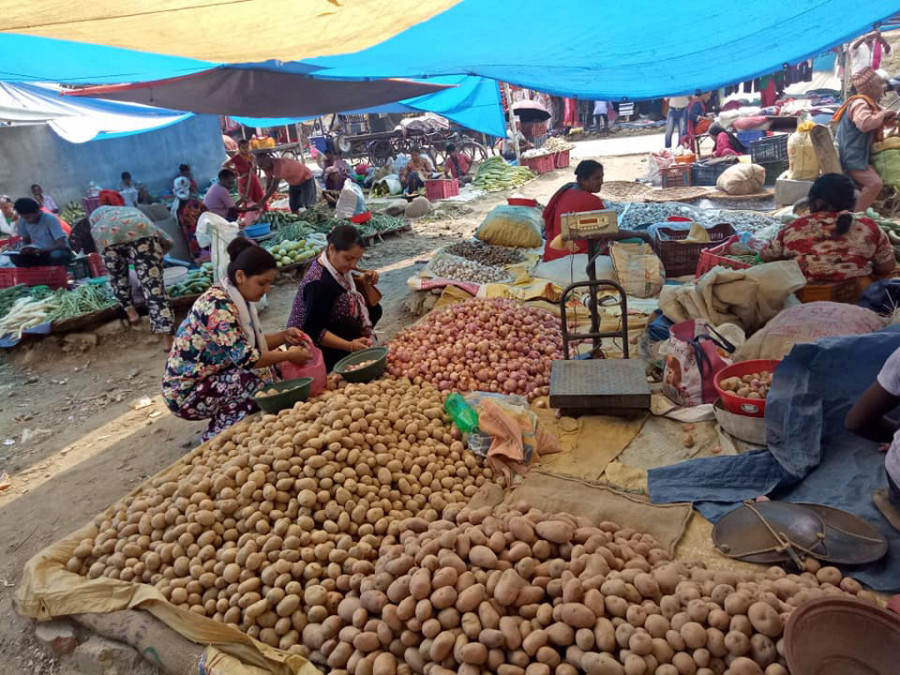Money
Retail prices in Province 5 rise steeply after release of budget
Consumers said market prices shot up by over 20 percent in a week, pushing up their food expenses.
Ghanashyam Gautam, Madhav Aryal & Thakur Singh Tharu
Retail prices in Province 5 have risen steeply since the federal budget was released two weeks ago even though it does not go into effect till mid-July. Sellers jacked up prices due to the tax hikes included in the government’s annual financial plan that would make goods dearer.
Consumers said market prices shot up by over 20 percent in a week, pushing up their food expenses. They accused shopkeepers of hoarding goods in anticipation of further price rises. Karnali and Gandaki provinces are also witnessing a sharp rise in market prices of edibles as they get their supplies from Butwal, the capital of Province 5.
In Butwal, prices of essentials such as rice, pulses, maize, gram and peas have jumped by Rs3 to Rs20 per kg. Biscuits, noodles and soft drinks have also become dearer by up to Rs25 per item. An increase in gasoline prices and consequent higher freight rates also made essentials more expensive.
Red gram, which cost Rs120 per kg before the budget was released, now costs Rs140 per kg. Pulses are consumed by a majority of households. Rice has also become more expensive by Rs100 to Rs300 per quintal. Prices of flour and soybean have also increased after the government imposed 13 percent value added tax on these essentials.
Since Butwal is a trade centre in the western region and is home to dozens of industries producing edibles, any price rise here has a ripple effect on market prices in many hilly districts in the three provinces here. Butwal is also the main transit point for goods imported from India through Bhairahawa and Birgunj. The imported goods are shipped to many hilly districts from here.
According to Rupandehi Retailer’s Association Chairperson Gangadhar Neupane, even retailers have not been able to source goods in adequate quantities with the rise in demand following the budget’s release. “Prices were expected to increase from mid-July after the budget goes into force, but the region has seen prices shooting up a day after the release,” said Neupane.
Wholesalers claimed that the rise in prices of edibles imported from India such as rice, sugar, pulses and tea was ‘regular’, and that it was caused by the recently concluded elections in India, not the federal budget. According to wholesaler Naresh Dhungana of Sidhha Baba Bhandar, the region has been witnessing the ripple effect of elections in India in the form of price fluctuations in daily essentials. “Domestic industries have not raised prices yet,” said Dhungana. “But prices are rising steadily because of an expanded value added tax basket and hike in gasoline prices.”
The freight rate to the hilly region has increased by Rs2 per kg due to dearer gasoline, said traders. Kali Charan Chaudhary of Badhaiyataal in Bardia said that cooking gas was in short supply, and that traders were sending away consumers saying that they were not getting deliveries. “With the rise in prices of edibles, there are rumors in the villages that cooking gas would become more expensive,” said Chaudhary. “And traders have been hoarded gas cylinders to capitalise on those rumors.”
The task of monitoring the market and checking offences has been given to the local units following the implementation of federalism. Bardia Chief District Officer Ram Bahadur Kurungbang admitted that prices had risen abnormally after the budget, and said that he would request the local units to keep tabs on errant traders.“We must punish the racketeers who have engaged in fraudulent practices capitalising on irrelevant events and mild instabilities,” said Kurungbang. “The local levels must act promptly to protect consumer rights.”
Traders in the region said that an increase in value added tax on freight services and excise duty had resulted in increased prices. According to Vice-President Shailendra Bhattarai of the Chamber of Commerce Palpa Chapter, the district has witnessed an increase in prices as traders in Bhairahawa and Butwal had shipped the goods at revised rates.
“It is an old practice to create artificial shortages by hoarding goods prior to the budget speech. And traders have continued the tradition,” said Bhattarai. “It is the consumers who bear the brunt every time.” According to Sharmila Thapa of Tansen Municipality, food is becoming more expensive as traders sell goods at higher prices following the budget speech annually.
“Prices of majority of edibles have escalated this year too,” she said.In Palpa, cooking oil has become dearer by Rs10 to Rs20 per litre over just a week, and sugar is costlier by Rs3 to Rs6 per kg. But officials of the Chamber of Commerce in Nepalgunj say that the traders have raised prices in line with the increase in taxes.“It is wrong to blame the traders for the increase in prices,” said Abdul Wahid Mansuri, vice-president of the Nepalgunj Chamber of Commerce. “The traders were forced to hike prices following the increase in tax rates.”




 9.83°C Kathmandu
9.83°C Kathmandu

















